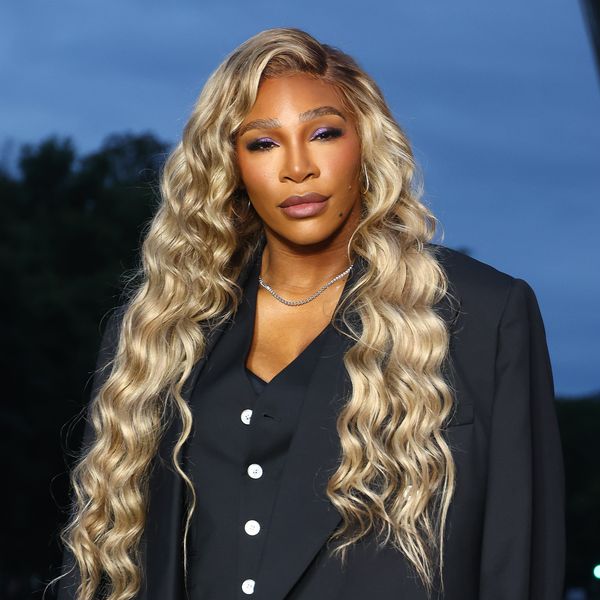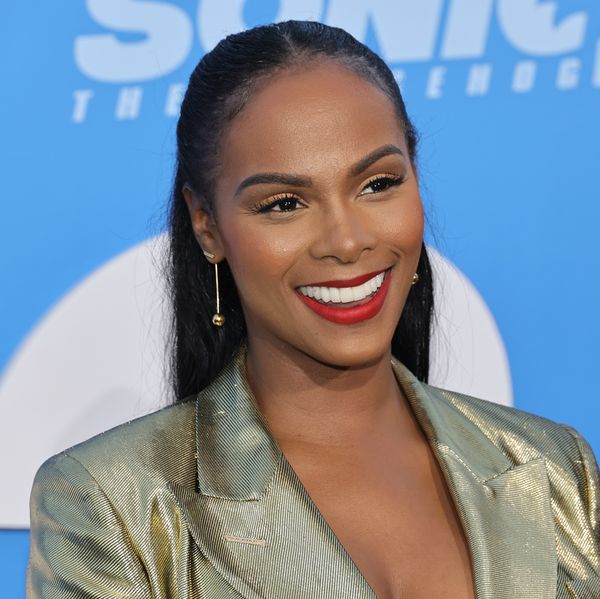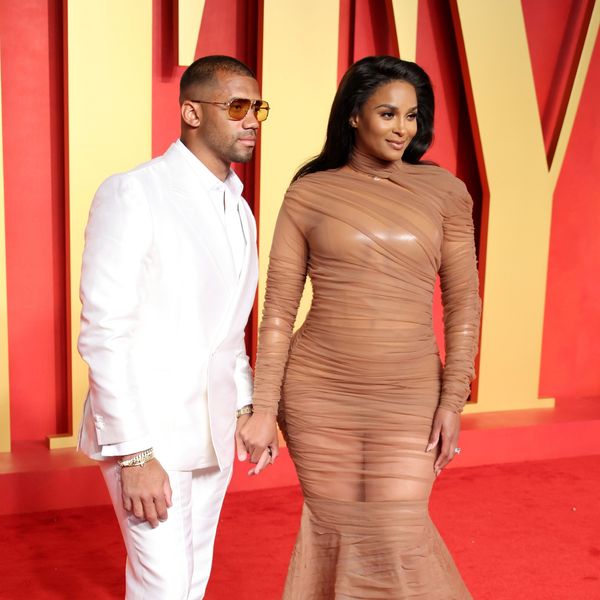Tracee Ellis Ross Breaks Down What ‘Wander, Ponder, And Be’ Means To Her

As Tracee Ellis Ross preps for her 50th birthday on October 29, the black-ish star is reflecting on the many things she’s learned along the way. One of those things is “wander, ponder, be,” which she uses to help her write speeches. During her interview with Hoda & Jenna, the beloved comedic actress gave insight into what those three words actually mean and how she applies them to her life. “I started figuring out the wander, ponder, be’s whenever I was writing a speech. Because in order to write a speech you just sort of have something come in from the inside,” she explained.
If it’s one thing that the Golden Globe winner is known for outside of acting, it’s her gift of gab. From her hilarious skits on social media to her energetic conversations in interviews, Tracee has always known how to use her voice and it also shines through in her speeches. Her speech during the 2017 Glamour's Women of the Year Summit went viral after she spoke against women’s accomplishments being diminished due to them not being married and/ or starting a family. It appears we have Tracee’s 'wander, ponder, and be' strategy to thank for that.
“I really needed time to wander, ponder, be and social media does not allow it,” she continued. “Because you take all your downtime so I like to give myself a chance to wander, to not know where I’m going but just wander, have time to just ponder, and just kinda play in the imagination of my mind and to be.”
She added, “And my favorite part of my life is my life like making food, and like going to the market and being in my life.”
While she isn’t shy about using her voice to speak on matters of the world, there is one thing she struggled to use her voice for—singing. Tracee shared that she always wanted to sing but was “too terrified” to follow in her mother, the great Diana Ross’, footsteps. She finally faced that fear after starring in the film The High Notewhere she plays a singer. But she recently realized that not using her gift of singing was only holding her back from creating new experiences in her life.
“What was interesting was as I was learning how to sing…I felt like I opened lifeways, not pathways but lifeways,” she said. “Not that I was necessarily meant to be a singer, but by cutting off that part of myself just because I was afraid, I had closed off certain doors to part of my identity and myself, and so things just started to open up when I found my voice.”
In need of a little motivation? Keep reading for 9 more noteworthy gems about life that Tracee has dropped over the years.
Tracee Ellis Ross on the Advice That’s Guided Her Through Life:
"There are two things that have been the biggest guides through my life. The first one is: Follow your heart and trust your instincts. The second is: What other people think is none of your business and even sometimes what you think of yourself is none of your business. Sometimes it’s about staying in action as opposed to trying to decide how to make people think a certain way about you." - via WSJ
On Lessons She Has Learned as an Entrepreneur:
"One is to trust my instincts. Two is, there’s so much more involved than I ever had any idea of—and I knew there was a lot involved. The biggest lessons have been around the consistency of relationships and communication with retail partners and also my team…. Because it is an hourly thing, particularly right now during the supply-chain issues that are going on. And then the last thing is, you don’t need a degree in CEO-dom or entrepreneurship in order to run a successful company. You need to surround yourself with very informed and excellent people and remain teachable without losing focus on your vision." - via WSJ
On Finding Meaning in Life:
"I feel that to a certain extent, we are the first generation of choice for women, who have had the opportunity to actually choose the lives they want to live…. The cultural expectation for women that they are meant to be mothers and married and that that is almost what makes their lives valid creates a scenario that I push up against in general. There's many places where that happens in our culture that I think are very limiting for women in terms of finding meaning in their own lives." - via Good Housekeeping
On Showing Her Full Self on Social Media:
“One of the reasons that I share so much on social media is that I recently turned 49. At this age, self-care, self-love, joy and drinking plenty of water are what keep your body strong. I love posting about this because it gives you the full picture of who I am. I’m not always the perfect Tracee on the red carpet. That’s not how I wake up. Various other things are needed for that.” via Elle Canada

Rich Fury/VF22/Getty Images for Vanity Fair
On Living Life on Her Own Terms:
"I didn’t see enough examples of different versions of how a woman can find happiness and joy and power and sensuality, sexuality, all of that, without it being through the lens of how I’m seen by a man. People are like, 'You’re the poster child for being single.' And I was like, 'Great.' But what I would prefer is that I’m the poster child for living my life on my terms. And that there’s a version of that for everyone.
"I don’t live my life for other people. I just totally live it for me. This is something that has really solidified itself into an unbreakable, unshakable foundation in the last four or five years." via Harper's Bazaar
On the Power of Her Womanhood:
"There's a power I started to feel when I began to call myself a woman that I wasn't tapped into as a younger girl. I've witnessed it in friends of mine and in people I don't know. It's the power that generates from this idea that our bodies can create life—even though not every woman creates life. It's a woman's ability to look at life a certain way, to create in a certain way, to be of service in a certain way, to care in a certain way." - via Glamour
On Detaching Herself From the Opinions of Others:
"What other people think about me is none of my business. Sometimes even what I think about myself is not my business. Opinions are like assholes: We’ve all got them. What I know is that I wake up every day trying to do my best. I know that my heart and my intention is in the right place. And if somebody points something out to me that I actually think is constructive and loving and I agree and I need to take accountability for it, I can do that. My selfhood and my sense of self can withstand appropriate criticism." via The Cut
On Finding Support in Dark Moments:
"The key is you ask yourself, What do I need right now? I’ve cultivated a relationship with myself where I know I have choices…. I have a toolbox of ways I can find support; journaling is helpful, or meditation. And I have had to really make friends with loneliness. And know the difference between choice-ful solitude and lonely. [I find comfort in] being able to name it, to say I’m feeling lonely, then to have a tribe of people I feel safe enough with to share: This is how I feel.
"I don’t have the luxury of not going to work when I don’t feel up to it. Most people don’t. On those days, I acknowledge I am feeling f-cking crappy, and I’m not at my best, and I still want to or need to keep walking forward. I have to do some of my best work on my worst days. I have to look pretty even when I don’t feel pretty. There’s a way to hold both things." - via Glamour
On How She Owns Her Own Narrative:
"By not letting other people’s ideas of me change my idea of myself. It means holding my own counsel and navigating my life on my compass, which is about my relationship with higher power, my relationship with those I trust and love." via The Cut
Let’s make things inbox official! Sign up for the xoNecole newsletter for daily love, wellness, career, and exclusive content delivered straight to your inbox.
Featured image by Handout/Getty Images
- Inspiring Empowering Issa Rae Quotes - xoNecole: Women's ... ›
- Body Positive Celebrities Who Love Their Bodies - xoNecole ... ›
- 20 Inspirational Celebrity Quotes, Success - xoNecole: Women's ... ›
- Tracee Ellis Ross Wants You To 'Do The Next Indicated Thing ... ›
- Advice From 25 Black Moms In Business - xoNecole: Lifestyle, Culture, Love, & Wellness ›
- Motivational Quotes On Success For Black Women - xoNecole: Lifestyle, Culture, Love, & Wellness ›
Exclusive: Melanie Fiona On Making High-Vibrational Music & Saying Yes To Partnership
Melanie Fiona is back! After taking a little more than a decade-long hiatus, she has officially made her return to music and blessed us with two singles, “Say Yes” and “I Choose You.” While both singles are very different from each other, they both reflect who she is today and the type of music she wants to make. In our conversation, the mom of two expressed what she learned during her time away.
“It's interesting, even when I said it is like coming back, I don't ever feel like I really left because I was always still performing. I've still been public. It's not like I went into being this recluse person or version of myself, but the thing that I really learned in this process is that I think things take time,” Melanie says in a xoNecole exclusive.
“I think often we're so caught up in it, being on the timing of demand or popularity, or, like, striking while the iron is hot and the thing that I've learned is that everything is on God's time. That's it. Every time I thought I would have been ready, or, like, things were taking too long, I had to reship some things, personally, professionally, in my life. I also gave myself permission to make a living, not just make a living, but make a life for myself.”
Making a life for herself included getting married to Grammy-nominated songwriter Jared Cotter, starting a family, and embracing new landscapes, such as podcasting as a co-host of The Mama’s Den podcast. She also began doing more spiritual work and self-care practices like meditation, sound healing, Reiki, acupuncture, and boundary setting, which allowed her to get in touch with her inner voice.
“I wasn't putting out music, and I wasn't experiencing a number one record, but I was being a number one mom,” she says.
“I was experiencing things that were allowing me to heal and get in touch with myself so that I could make new music from a space of joy and freedom, and excitement again because I definitely feel like I did lose some excitement because of just politics and industry and what it can do to your mental health and even your physical health. So giving myself the space to really just say, ‘Hey, it's okay. Everything's right on time.’”
The joy and excitement are felt in one of two new singles, “I Choose You,” which is more of a lovers rock vibe, a tribute to Melanie’s Caribbean roots. While the Grammy award-winner is known for ballads like “It Kills Me” and “Fool For You,” she is becoming more intentional about the music she makes, calling it high-vibrational music. She says her music is a “reflection of my life,” as it captures every facet, from hanging out with friends to riding around in her car.
“Say Yes” has the classic R&B vibe Melanie is known for. However, both songs are inspired by her relationship. Melanie and Jared got married in December 2020, and the Toronto-bred artist dished on their relationship. Fun fact: he is featured in the “Say Yes” music video.
“When we first started dating, I had come into that relationship post a lot of self-work. I had gotten out of a long-term relationship, I had a year and a half to date and be by myself and do a lot of work on myself alone. And when we met, I remember feeling like this has to be my person because I feel it,” she says.
“And so when we went into that relationship, and we started dating, I was very clear. I was like, I know what I want. I'm very clear on what I need, and I'm not going to withhold my truth about myself in this process because of pride or fear of rejection. I know you love me, but I'm coming with my heart in my hand to let you know that if we're gonna get there, we have to put fear aside and say yes. So that was kind of like my open letter to him, which is why the video is us having a conversation.”
Melanie also shares that saying yes to her partner has empowered her in many ways, including motherhood and showing up for herself. Her new EP, also titled Say Yes, will be available at the top of 2025.
Check out the full interview below.
Let’s make things inbox official! Sign up for the xoNecole newsletter for love, wellness, career, and exclusive content delivered straight to your inbox.
Feature image by Franco Zulueta
Hot Girl Moms: How These Black Celebrities Are Breaking Motherhood Stereotypes
Lately, I have really been in awe of Black moms — from my friends to celebrities. It's both beautifully surprising and thought-provoking to see your people navigating parenthood. Beyond this, it's truly inspiring to witness these Black women redefine motherhood, challenge societal norms, and pave the way for future generations.
One thing that has stood out is the way they choose to mother while also honoring themselves in every way. For one, motherhood doesn’t mean trading in your style, confidence, or ambition. There are powerhouse Black women who effortlessly balance being moms while keeping their hot-girl energy intact. From rocking stages to slaying red carpets, we decided to round up some celebs who redefine what it means to have it all.
These women are living proof that you don’t have to trade in your hot girl card when you become a mom. They’ve shown the world that you can be a caregiver and still exude the confidence, ambition, and style that makes you, you. Who says you can’t have it all?
Beyoncé

(L-R) Beyoncé and Blue Ivy Carter
Amy Sussman/WireImage
When you’re Queen Bey, there’s no dimming your light—ever. As a mom to Blue Ivy and twins Rumi and Sir, Beyoncé continues to dominate the music industry, embodying grace, power, and unmatched work ethic. From headlining Coachella to dropping jaw-dropping visuals for Renaissance, she proves motherhood only enhances the glow. In 2013, Beyonce told Vogue, that becoming a mother helped her to really understand the power of her body:
“I just feel my body means something completely different. I feel a lot more confident about it. Even being heavier, thinner, whatever. I feel a lot more like a woman. More feminine, more sensual. And no shame.”
Victoria Monét
Victoria Monét is the epitome of "cool mom energy." With her adorable daughter Hazel as her muse, she’s kept us grooving with tracks like "On My Mama." Balancing new motherhood and a skyrocketing career, she’s proof that you can have it all—and look flawless doing it.
During an interview with Self, Victoria shared, "After I had Hazel, I went into a full depression. I was very hard on myself, and just judging so much and worrying about what I used to look like and what I used to have. It’s just all living in the past, which is the setup [for feeling like a failure]," she says. "[But] you have to think forward. It’s been a battle to be okay with whatever size I am at the time. So if I go to Disneyland with Hazel, I’m not going to be worrying about the churro, because we’re only at Disney one day."
Jhené Aiko
Jhené Aiko keeps her ethereal energy strong as a mom to two kids, Namiko Love and Noah Hasani. From creating soulful, healing music to co-parenting like a pro, Jhené’s free-spirited essence shows you can nurture both your kids and your inner goddess.
This year, The Purple Agency honored a select group of prominent mothers for their inaugural Mom Honors and the "Stay Ready" singer was among the honorees. Aiko delivered a moving keynote address to conclude the event, sharing her lifelong aspiration of being a mom:
“I always knew I wanted to be a mom more than anything. That was my dream. This is great and I love to do this, but this is not my dream […] It’s fun, but nothing fulfills me more than being a mom."
Ciara
Ciara is serving hot girl mom with no signs of slowing down. From slaying the red carpet with Russell Wilson to inspiring moms everywhere with her fitness and dance routines, Ciara makes sure motherhood doesn’t put a pause on her glow-up. It’s clear that motherhood drives this Atlanta girly. CiCi told Yahoo Music:
“For me, I can speak for myself: Being a mom gave me a bit more of sexy confidence. And it's not about what I'm wearing, it's just more of an internal feeling. I feel there's something very cool about being able to deliver a child, and being able to work hard to get yourself back to that place before you had that child. It's a rewarding feeling… If anything, I think the sexy gets turned up even more!”
Serena Williams
Serena might have retired from professional tennis, but her "hot girl mom" era is still thriving. As a mom to Olympia and a new baby girl, Adira River, Serena continues to serve Black excellence, whether she’s owning the boardroom or slaying on social media. Speaking about how she became to be such a fearless woman toAllure, Serena said:
"I think my mom instilled in us to be confident women, to really believe in ourselves, be proud of our heritage, our hair, and our bodies. That was something that was really important for her to teach us. I’m definitely teaching it to my daughter.”
Rihanna
The billionaire beauty mogul, music icon, and now mother of two, Rihanna is redefining motherhood with unapologetic confidence. From rocking her baby bump at the Super Bowl to running her Fenty empire, Rih proves being a mom only amplifies the bad gal energy.
When asked about how motherhood initially felt for her, she told British Vogue, “Oh, my God, it’s legendary.” Rihanna also affirmed, "Women just need a little bit of validation," she said to The Associated Press. Adding, "You are beautiful. Your body's beautiful. Your body is sexy and you deserve to feel that way."
Cardi B
Cardi’s personality remains larger than life—even as a mom of two. Between her jaw-dropping fashion moments and hilarious, unfiltered parenting takes, she proves motherhood doesn’t stop you from being the life of the party. The Bronx native has had no problems sharing that she has so much compassion—and love and appreciation— for all mothers in the world.
“There is no excuse, we have to do it. I have compassion for good mothers who get up and hustle and work, or even not work—having kids is work. Raising a kid is work.”
And what a feat to work and werk at the same time!
Teyana Taylor
Teyana Taylor is the queen of doing it all. As a mom of two daughters, Iman Jr. and Rue, she balances a multifaceted career as a singer, director, and actress, all while keeping her edgy, hot-girl aesthetic on lock. Teyana Taylor's exceptionally toned physique, showcased in Kanye West's "Fade" music video just eight months after giving birth, ignited widespread admiration and inspired many women to prioritize their fitness goals.
“I love that I can inspire women to feel that way,” she told The FADER. “This video was to do just that. To inspire women and to let them know that we are super women, each and every one of us.”
Kelly Rowland
As a mom to Titan and Noah, Kelly Rowland stays killing the game with her elegance and star power. From her music to her dedication to fitness and fashion, she’s proof you can slay in both the boardroom and the playroom. When it comes to finding the balance of doing it all, she told Scary Mommy:
“I think [that’s] the hardest thing about being a mom. How can I be the best mom, wife, friend, and version of myself all at once? It can be overwhelming at times, but I’ve learned to become more patient with both others and myself, and remind myself it’s okay not to be everything for everyone all of the time.”
Flo Milli

Flo Milli
Taylor Hill/Getty Images
While the “Never Lose Me” singer just announced her pregnancy on Nov. 25, we just know she’s gonna give hot mom vibes. The rapper took to social media sharing, “Flo mommy s— i can’t even see my coochie nomore that’s crazy.” She proudly displayed her baby bump in a series of photos, wearing a white crop top and orange shorts, reminding us that Flo Milli will always remain true to herself.
In an interview with Elle, Flo Milli shared she was raised in a nurturing environment with strong female role models, and she was inspired by neo-soul artists who emphasized self-love and empowerment. These influences instilled in her a strong sense of self-worth, which she actively promotes, particularly for dark-skinned Black women who often face challenges in the music industry. Flo Milli believes that self-perception is paramount, regardless of external opinions.
Let’s make things inbox official! Sign up for the xoNecole newsletter for love, wellness, career, and exclusive content delivered straight to your inbox.
Featured image by









